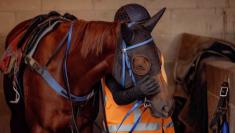
Bernard's Blog - 4 October
The topic of whip use has been to the fore again lately, driven by comments from trainer Shaune Ritchie on the TAB’s Weigh In programme a few weeks back.
As Shaune so rightly notes, it is a discussion which we cannot shy away from, and NZTR welcomes the fact that our industry is open to looking at how racing might evolve in the future. As mentioned in my Blog on 30 August, there is on-going debate in Australia around whip use which was being driven by trainers in NSW.
Change is coming in this area with new rules regarding whip use bringing us into line with Australia coming into effect on Monday, 7 October.
Simply put, this will mean that in any flat race, trial or jump out prior to the 100m mark the whip will be able to be used on just five occasions, and not on consecutive strides. In the final 100m the whip may be used at the rider’s discretion.
In jumping races, jumping trials or schooling occasions, the whip may not be used more than 10 times prior to the 100m. In the final 100m the whip may be used at the rider’s discretion, but not in consecutive strides.
Riders in both flat and jump events are permitted to use the whip with a slapping motion down the shoulder, with the whip hand remaining on the reins.
When it comes to amateur races this is the only way the whip may be used, with the whip not being permitted to be used in a drawn position at all.
In addition to these regulations it is also unacceptable for the rider to use a drawn whip when a horse is out of contention; showing no response or has no reasonable prospect of improving or losing its position.
When a horse is clearly winning or has passed the winning post also falls into this category. Riders are also not permitted to use the whip with the arm above shoulder height, or to cause injury to the horse.
The rules also extend to anyone who might give instructions to a rider regarding the use of the whip which, if carried out, might result in a breach of the whip guidelines.
The NZ Jockeys’ Association recognised, and welcomed, the need for these changes to bring us into line with Australia and we are grateful for their support in this area.









